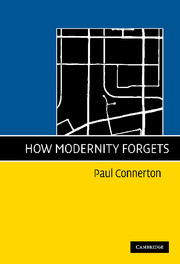3 - Temporalities of forgetting
Published online by Cambridge University Press: 05 July 2015
Summary
Many modern material practices are implicated in the process of cultural forgetting. To observe these in operation we need to distinguish between different categories of temporality, where by temporality I mean institutionalised and organised time schedules which crucially structure a person's experience of time. The different temporalities I want to distinguish are: the time of the labour process; the time of consumption; the time of career structures; and the time of information and media production. In each case, I want to suggest that the specific type of modern temporality entails an abbreviation of history and a corresponding form of cultural forgetting. Two further corollaries should be noticed. First, each particular temporality reinforces the others to precipitate a reciprocally interlocking cascade of temporalities; it is their combined effect which generates a systematic form of cultural forgetting. Secondly, none of the temporalities can be understood without comprehending the spatial dimensions which are ingredient and intrinsic to them.
I
The modern world is the product of a gigantic process of labour, and the first thing to be forgotten is the labour process itself. At one level, of course, to say this might seem puzzling or even perverse; working time is made explicit under capitalism as never before; making the most of available time becomes the supreme principle for human activities and technological artefacts. For human beings: because time-discipline means that they are perpetually pressed for time. For technological artefacts: because machines can ‘survive’ economically only when they are adaptable to shortage of time, with the predictable end result that in information-intensive technologies they attain velocities far exceeding human perception. Under capitalist social formations, then, certain forms of social relations are quite transparent in the undisguised adversarial positions of capitalist and worker over the explicit control over working time. What, by contrast, becomes opaque is that form of time essential to the transformative process of labour.
- Type
- Chapter
- Information
- How Modernity Forgets , pp. 40 - 98Publisher: Cambridge University PressPrint publication year: 2009

